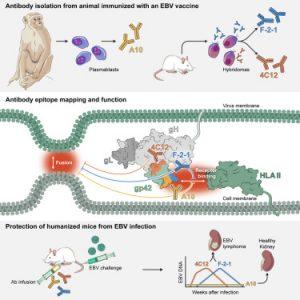Scientists have identified a promising target for developing vaccines and treatments against the Epstein-Barr virus (EBV). This study offers a potential path towards preventing EBV-related diseases (Figure 1). There’s currently no vaccine or specific treatment for EBV infection.
EBV is a virus that establishes a lifelong residence in our bodies, particularly in immune cells called B-lymphocytes. While most people experience no serious issues, EBV can sometimes lead to certain cancers, including lymphomas and nasopharyngeal cancer.
This study focused on a key protein on the EBV surface called gp42, which the virus uses to infect B-cells. The researchers created two monoclonal antibodies (mAbs), A10 and 4C12, that specifically target gp42.
The exciting part: the mAbs attached to different areas of gp42. A10 blocked the docking site for the virus on B-cells, while 4C12 interfered with the virus’s ability to fuse with the cell membrane. In mice treated with mAb A10 showed almost complete protection from EBV infection, with none developing lymphomas. In contrast, mice receiving other mAbs became infected, and some developed lymphomas.
If further studies show A10 to be safe and effective in humans, it could be a game-changer for several groups:
- People who haven’t yet encountered EBV
- Individuals with weakened immune systems
- Transplant recipients
This research not only identified a potential treatment avenue but also provides valuable insights for future vaccine development. By targeting the vulnerable sites on gp42 revealed by this study, scientists might be able to design vaccines that elicit protective antibodies against EBV.
Journal article: Bu, W., et al, 2024. Epstein-Barr Virus gp42 Antibodies Reveal Sites of Vulnerability for Receptor Binding and Fusion to B Cells. Immunity.
Summary by Stefan Botha











